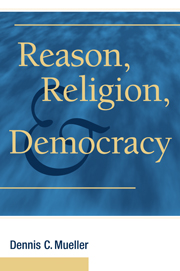Book contents
- Frontmatter
- Contents
- Preface
- 1 Liberal Democracy
- PART I FUNDAMENTALS: EVOLUTION, PSYCHOLOGY, REASONING, AND RELIGION
- PART II A HISTORICAL LOOK AT THE STATE, DEMOCRACY, AND RELIGION
- PART III THE INSTITUTIONS OF LIBERAL DEMOCRACY
- 10 Democracy and Citizenship
- 11 Rights
- 12 Education, Citizenship, Immigration, and Democracy
- PART IV CHALLENGES TO LIBERAL DEMOCRACY
- References
- Author Index
- Subject Index
12 - Education, Citizenship, Immigration, and Democracy
Published online by Cambridge University Press: 05 June 2012
- Frontmatter
- Contents
- Preface
- 1 Liberal Democracy
- PART I FUNDAMENTALS: EVOLUTION, PSYCHOLOGY, REASONING, AND RELIGION
- PART II A HISTORICAL LOOK AT THE STATE, DEMOCRACY, AND RELIGION
- PART III THE INSTITUTIONS OF LIBERAL DEMOCRACY
- 10 Democracy and Citizenship
- 11 Rights
- 12 Education, Citizenship, Immigration, and Democracy
- PART IV CHALLENGES TO LIBERAL DEMOCRACY
- References
- Author Index
- Subject Index
Summary
And so, my fellow Americans, ask not what your country can do for you – ask what you can do for your country.
(John F. Kennedy, Inaugural Address, January 20, 1961)A well-functioning liberal democracy requires political institutions that transform the stated preferences of citizens into policies, which advance community welfare; a set of constitutional rights and impartial judiciary, which protects individual liberties from the state; and well-informed and intelligent citizens who espouse the values of liberal democracy and exercise their duties as citizens conscientiously. The previous two chapters have discussed the first two requirements; in this chapter we take up the third. The task of ensuring that those born in a country become well-informed, intelligent citizens who espouse the values of liberal democracy falls on its education system. The task of ensuring that those who enter a country have these characteristics falls to its immigration policy. This chapter takes up both issues.
Why State Education?
Why should the state finance education? School doors, like movie theaters' doors, can be closed and admission fees charged. Thus, education can easily be supplied as a pure private good. Because states everywhere finance and usually directly supply education, this might seem like a silly question. However, upon reflection it becomes less obvious why the state ought to supply education. Most readers of this book probably had a free education for a part of their lives.
- Type
- Chapter
- Information
- Reason, Religion, and Democracy , pp. 316 - 352Publisher: Cambridge University PressPrint publication year: 2009



